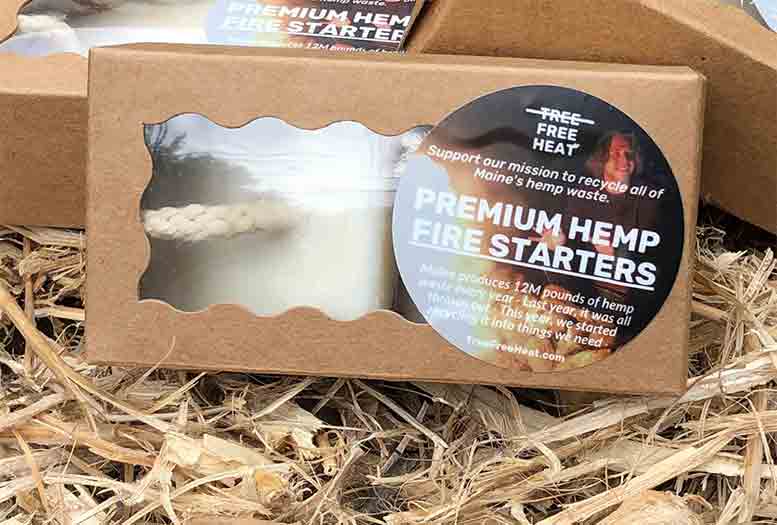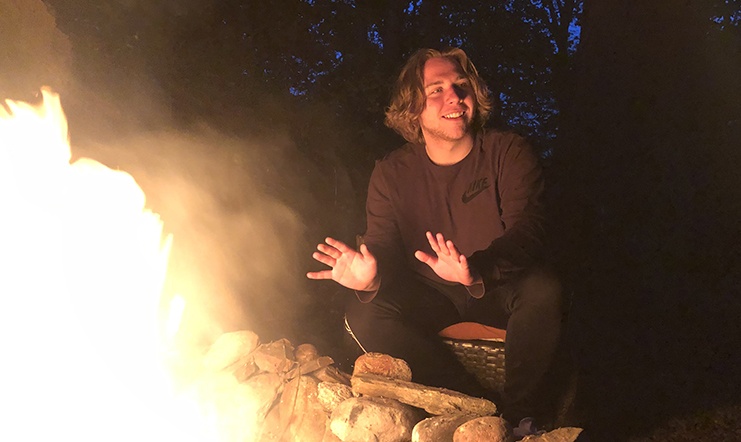When Dylan Veilleux arrived at the idea for transforming leftover hemp stalks into products, he turned to the vibrant startup community in the U.S. state of Maine, finding support and building key relationships first.
He got help prototyping his ideas from advisers at Bricks Coworking & Innovation Space, a business development & networking center, and the Central Maine Growth Council in Waterville, Maine, a regional economic development group.
Once he started developing products at his new company, Tree Free Heat, connections Veilleux made at the Maine Outdoor Brands collective helped to build up distribution of the company’s first product – a fire starter made of hemp hurd, soy wax and citronella – among wholesale customers, outdoor sports stores, and dispensaries.
Sharing, sharing
Syncing with outdoor gear startup Back40 has helped boost fire starter sales online. “We anticipate that online sales will be an increasingly important aspect of our sales growth,” Veilleux said. But there are other benefits. “Beyond the positive impact of sales through Back40’s website, working with other outdoor startups has allowed for us to collectively share trends, bounce ideas, and promote our startups,” Veilleux said.
Wood and Sons, a pellet manufacturer, has helped Tree Free Heat develop the hemp fuel pellets that will be on the market this autumn. Another Maine company, CannaWaste Recycling, has been an important supplier, Veilleux said.
“They’ve served as a constant partner, with help, support, and encouragement,” Veilleux said of his fellow entrepreneurs in Maine. “As the founder of a small startup, Maine’s affordability and the supportive startup community, especially during the COVID-19 crisis, has been the ideal place to grow.”
Inspiration
Veilleux said he became intrigued by hemp while studying at university. Finding biofuel to be the most attractive application, he started researching the topic before moving on to work on a hemp farm. “I discovered that Maine farmers have no outlet for their stalks, which could be utilized as a resource for alternative energy,” Veilleux said of the nearly 4,000 tons of plant waste Maine’s hemp farmers leave behind every year. Hemp’s relatively short growth cycle led Veilleux to the idea of producing alternatives to timber based fire starters, bio-bricks and pellets.
“We view the hurd and fiber as untapped resources that can be recycled into valuable products,” Veilleux said of his company. “We’re not just a company that sells hemp products. We’re a biofuel company that sources hemp waste as a fuel source.”

A three-man production team turns out the fire starters, mixing processed hemp waste and liquid wax into custom molds. Dipping the starter wick in citronella turns the firestarter into a natural mosquito repellent when burning. The company also distributes its fire starters through local Maine Kampgrounds of America (KOA) outlets, a key channel. KOA is North America’s premier campground company, with more than 500 locations across the USA, giving Tree Free Heat national growth potential for its camping oriented products.
Heating pellets
The company is now gearing up to introduce a second product, hemp heating pellets for Maine’s harsh winter season, having recently ordered a HurdMaster micro-decorticator to enhance the production process. Because the pellets use the same raw material as the company’s fire starters, Tree Free Heat already has a reliable, affordable value chain in place for production, Veilleux said.
“We look forward to continuing to experiment with new products as well as different sales and distribution strategies,” Veilleux said. “We will continue to pursue partnerships with other outdoor brands where we can leverage our resources to benefit each other.”

